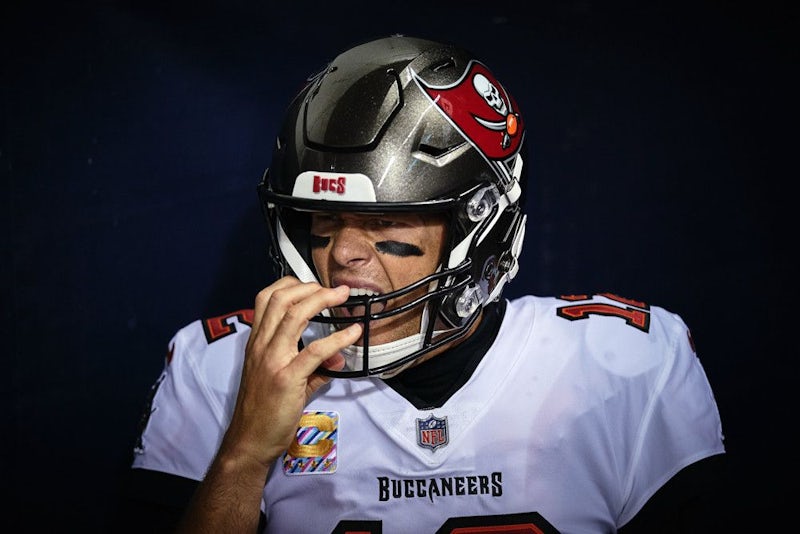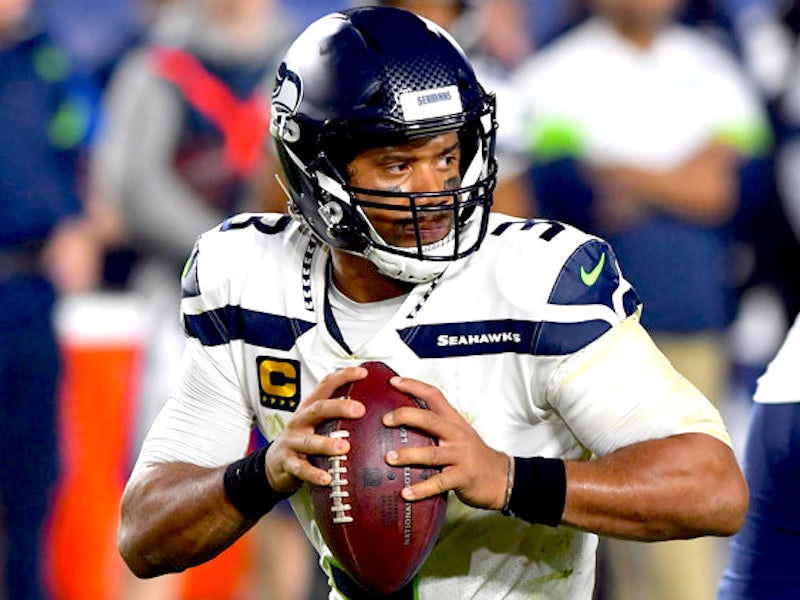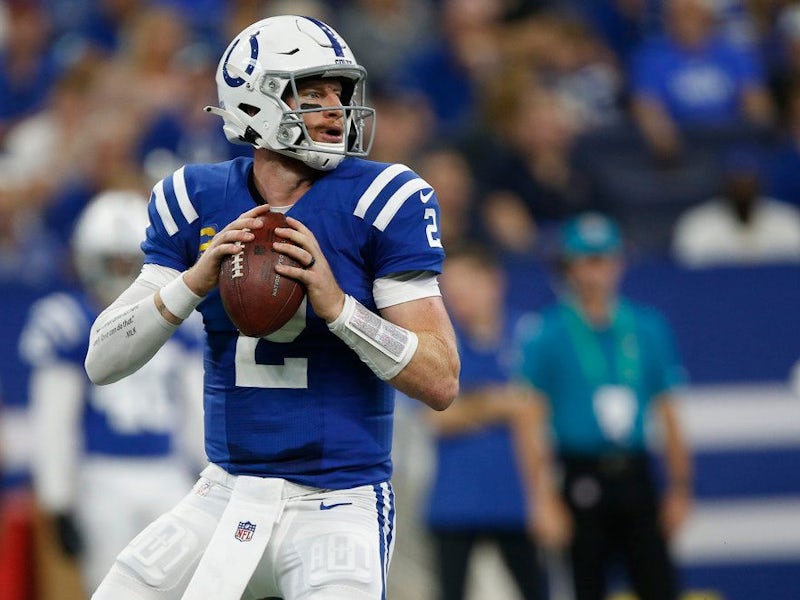ADVERTISEMENT
The anatomy of a GOAT: What makes Tom Brady the greatest of all time

Tampa Bay Buccaneers quarterback Tom Brady (12) adjusts his helmet prior to game action. (Photo by Robin Alam/Icon Sportswire)
Love him or hate him, Tom Brady is undeniably the greatest football player of all time.
The 44-year-old signal caller announced his retirement from the sport on Feb. 1, 2022, at the end of his 22nd season, closing the door on a career that included seven Super Bowl titles (two more than the next closest player), an unprecedented 10 Super Bowl appearances, five Super Bowl MVP awards, three league MVPs, 15 Pro Bowl nominations, and nearly every major career record at quarterback.
With a résumé like that, you would be hard-pressed — and downright stubborn — to argue any player did it better. And while the G.O.A.T. debate may still linger long after Brady's time in the NFL has passed, his legend is untouchable.
In honor of the icon's recent retirement announcement, let's explore the makeup of the greatest of all time, as we dissect the anatomy of a G.O.A.T.
The head
Upon entering the NFL in 2000, Brady was not the most physically gifted specimen — as seen in his infamous draft combine photo — so to push himself to a superior level of excellence, he had to outsmart and outwork his competition.
Brady was not only intelligent — he scored a 33 on his Wonderlic — but he was dedicated to learning.
His longtime coach Bill Belichick once spoke of Brady's approach to football, saying, "There’s some things that he sees that I just don’t see, and I think the reverse is true... I love football. I love learning about football. I think Tom is the same."
Accompanied by his steadfast work ethic and studiousness, Brady also honed his mental toughness and shut out the doubt surrounding his abilities, as he sat far back on the depth chart, as a fourth-stringer during his rookie season.
Brady stayed ready and his chance to prove himself came quickly, in the second game of the 2001 season, when he stepped in for an injured Drew Bledsoe on the final series of a 10-3 loss to the New York Jets.
Brady was put in charge of the offense the following game and went on to compile an 11-3 regular season record as New England's starter.
Then, on the NFL's biggest stage, Brady stunned the football world against the "Greatest Show on Turf," as he spearheaded a game-winning drive in the final minutes of Super Bowl XXXVI.
John Madden and Pat Summerall’s final game together was Tom Brady’s first Super Bowl (XXXVI) and you can just tell Madden knew how special Brady was going to be. (Via @NFL and @NFLonFOX) pic.twitter.com/z55kR20bJH
— Jared Stillman (@JaredStillman) December 29, 2021
That Super Bowl win marked one of 14 postseason game-winning drives by Brady.
He also led 51 career fourth-quarter comebacks, including nine in the postseason, and 53 game-winning drives in the regular season, one shy of Peyton Manning's record.
One of his most famous come-from-behind victories happened in Super Bowl LI, as Brady carried his team back from a 28-3 deficit midway through the third quarter to force overtime and ultimately defeat the Atlanta Falcons, 34-28.
Although he trailed by 25 points in the biggest game of the year, Brady never wavered.
Even more impressive, Brady claimed that Super Bowl title the same season he endured a heap of scrutiny and a four-game suspension for his alleged involvement in Deflategate.
The weight of adversity only made him stronger, and he consistently focused in on what mattered to him most. That takes a degree of mental fortitude few possess.
The heart
Part of the reason Brady's story is so extraordinary is the fact the Michigan product was an unheralded prospect, who was drafted with the 199th overall pick by the Patriots.
Brady's draft position was so low, he got a call from a Patriots assistant on draft night — not Belichick — to welcome him aboard the team.
And while many people questioned his potential, Brady's passion for football and his belief in himself propelled him to achieve more.
Congratulations on an incredible career @TomBrady. Your drive, passion and commitment is inspiring. You’re the main reason I started following the sport and love the @NFL. Thank you! 🐐🙌 https://t.co/c3DlsQ9VUV
— Harry Kane (@HKane) February 1, 2022
As he wrote in The Players Tribune, just after he signed with the Tampa Bay Buccaneers in 2020: "People ask sometimes what motivates me. The answer is simple. I love my sport. I love doing what I do. I want to keep doing it until I don’t want to do it anymore. Playing football isn’t something you can do alone in a backyard either. Football is a team sport, and getting a chance to collaborate with my teammates is a big reason I was drawn to the game in the first place."
The backbone
Speaking of teammates, Brady isn't just dedicated to becoming the best player he can be, he also strives to make those around him better.
Loyalty is a key part of Brady's character, and he has remained committed to his longtime friendships with teammates at both the Patriots and Buccaneers.
There are countless stories about the kind of person Brady was on and off the field, and the dedication he showed to those closest to him.
As former teammate Danny Amendola explained in an article in Sports Illustrated, "As good as a football player as he is, he’s an even better friend, even better person… Whether it’s been getting out to Montana or going to the [Kentucky] Derby or just having us over for dinner, he’s always the same. He’s always there to help. He’s actually like a big brother to everyone.”
Tom Brady, Rob Gronkowski and the boys are headed the Kentucky Derby. (via @stevesilva) pic.twitter.com/VFbEDFwlt7
— SportsCenter (@SportsCenter) May 1, 2015
Brady's bond with his teammates could be witnessed throughout his entire career, and especially during his two-year stint in Tampa Bay. Once he decided to join forces with the Bucs, he brought Rob Gronkowski out of retirement and persuaded Tampa Bay to give troubled star Antonio Brown another chance in the league.
Together, all three of them played a significant role in bringing the franchise its second Super Bowl title in Brady's first season with the NFC South squad.
The heel
Without a solid foundation from which to stand and his willful determination, Brady never would have been able to reach the inordinate heights of his career.
Every G.O.A.T. likes to climb, and Brady never settled for the standard. His best was never good enough, because he repeatedly thought he could do more.
As Brady wrote in The Players Tribune at age 42: "I have things to prove to myself... If I don’t go for it, I’ll never know what I could have accomplished. Wanting to do something is different from actually doing it. If I stood at the bottom of a mountain, and told myself I could scale the highest peak, but then didn’t do anything about it, what’s the point of that?"
Few boast the same ambition and resolve as Brady, and not many can claim his same type of competitive spirit, either.
“A lot of times I find that people who are blessed with the most talent don’t ever develop that attitude, and the ones who aren’t blessed in that way are the most competitive and have the biggest heart.” - @TomBrady pic.twitter.com/130XwoRjS4
— Tim Meads (@TimMeadsUSA) February 2, 2022
His disdain for losing was just as much a motivator as his love for winning, and even a game of table tennis was deemed serious competition, as Amendola can attest.
Brady's competitiveness and near-invincibility also made him a bit of a heel — to borrow a term from the WWE.
Many NFL fanbases loathe Brady because of the agony he caused them in the regular season and postseason. But in time, some of his most enthusiastic haters grew to respect him, because part of becoming the G.O.A.T. is being undeniably great.
The tail
For all the accolades and milestones Brady celebrated in his career, what truly made him the G.O.A.T. was the way in which he rounded out his tenure in the NFL.
At age 44, he ranked first in the league in passing yards (5,316), touchdown passes (43), completions (485), and attempts (719), and became the oldest player to win a Super Bowl and Super Bowl MVP the year prior.
He also retired first in career passing yards (84,520), touchdown passes (624), and regular season wins (243) and postseason wins (35).
There are many G.O.A.T.s in other sports, such as Michael Jordan, Serena Williams, Tiger Woods, and Wayne Gretzky, who embodied many of the qualities of Brady. But only the best of the best can say, from the beginning to the tail end of their career, they were at the top of their game.
Brady left everything he had on the gridiron, and truthfully, probably could have left more, if he wanted to keep competing.
But the wise G.O.A.T. he is, he knew he was ready to begin a new journey and leave the playing field to the next generation, filled with many players who are now greater because of the legacy Brady has left behind.
ADVERTISEMENT


